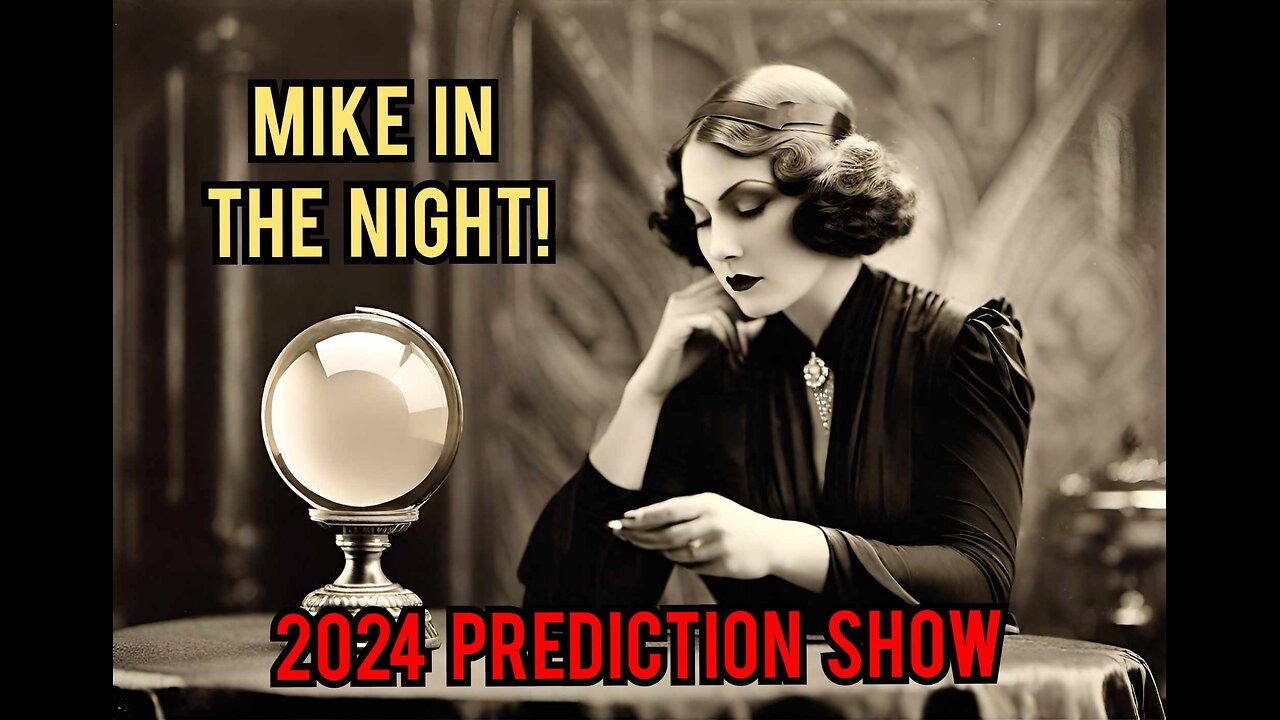Premium Only Content

Mike in The Night E537 , No 2024 Elections in the USA , Your 2024 Prediction show , your Call ins , your Vison
Buy Mike A Coffee - https://donorbox.org/buy-me-a-coffee-53
Link to the Most Powerful Glutathione https://mikeinthenight.neumi.com/home
Rumble -
https://rumble.com/c/realmikemartins
Dlive -
https://dlive.tv/MikeMartins
Twitch -
https://www.twitch.tv/mikemartins1/videos
ODYSEE -
https://odysee.com/@MikeMartins:7
X-
https://twitter.com/MikeMar86082350
Youtube -
https://www.youtube.com/channel/UCPPVzfUYflGiVSJ7AAGIsHg
Facebook -
https://www.facebook.com/realmikemartins/
Gab - https://gab.com/realmikemartins
People make predictions for various reasons, and the motivations behind predictions can vary depending on the context and individual goals. Here are some common reasons why people make predictions:
Understanding and Anticipation: Predictions help individuals and organizations anticipate future events or outcomes. By making predictions, people seek to understand what might happen and prepare for potential scenarios.
Decision-Making: Predictions inform decision-making processes. Whether in personal life or business, having an idea of what the future may hold allows individuals to make more informed choices and strategic decisions.
Risk Management: Predictions are often used in risk assessment and management. By forecasting potential risks or challenges, individuals and organizations can implement measures to mitigate those risks and minimize negative impacts.
Planning and Strategy: Predictions play a crucial role in planning and strategy development. Businesses, governments, and individuals use predictions to formulate plans and strategies that align with expected future conditions.
Investment and Financial Planning: In the financial world, predictions are frequently made to guide investment decisions. Investors and financial analysts use forecasts to assess potential returns and risks associated with different assets.
Innovation: Predicting future trends and developments can drive innovation. Businesses and researchers make predictions to stay ahead of the curve, identifying opportunities for new products, services, or technologies.
Scientific Inquiry: In scientific research, predictions are a fundamental part of hypothesis testing. Scientists use theories and models to make predictions about the outcomes of experiments or observations, helping to validate or refine their understanding of natural phenomena.
Personal Development: Individuals may make predictions about their own lives as part of personal development efforts. Setting goals and envisioning future achievements can serve as motivation and guide behavior.
Entertainment and Speculation: Predictions can also be made for entertainment purposes. People enjoy speculating about future events, such as sports outcomes, award winners, or plot twists in movies and TV shows.
Fulfillment of Curiosity: Curiosity is a natural human trait, and making predictions can be a way to satisfy this curiosity. People may be interested in what the future holds, even if the predictions are speculative.
While predictions can be valuable, it's important to recognize that the future is uncertain, and not all predictions come true. Factors such as unexpected events, technological advancements, and changes in human behavior can influence outcomes. Nonetheless, making predictions can be a useful tool for navigating an uncertain future.
predictions, anticipation, decision-making, risk management, planning, strategy, investment, financial planning, innovation, scientific inquiry, personal development, entertainment, speculation, curiosity, future trends, challenges, goals, motivation, business, government, individuals, research, theories, models, experiments, validation, refinement, natural phenomena, entertainment, sports, technology, uncertainty
-
 2:47:08
2:47:08
Mike Martins Channel
20 days ago $0.59 earnedMike in the Night E622- World Leaders Doubling down on your Destruction, Next weeks News Today, Call ins, Headlines
4523 -
 LIVE
LIVE
FyrBorne
10 hours ago🔴Battlefield REDSEC Live M&K Gameplay: Pyro+ Games
302 watching -
 LIVE
LIVE
Lofi Girl
3 years agolofi hip hop radio 📚 - beats to relax/study to
488 watching -

BBQPenguin_
2 hours agoEscape From Tarkov 1.0 Wipe! New Story & Full Release!
5 -
 LIVE
LIVE
Midnight In The Mountains™
43 minutes agoMorning Coffee w/ Midnight & The Early Birds of Rumble
241 watching -
 24:21
24:21
a12cat34dog
1 day agoGUITAR HERO AT DREAMHACK | HALLOWEEN 2025
16.2K9 -
 LIVE
LIVE
B2ZGaming
8 hours agoB2Z.... Assemble! | B2Z Gaming
74 watching -
 LIVE
LIVE
Joe Donuts Live
1 hour agoWill Ferrell Movie Rankings + The Impossible Quiz Challenge
61 watching -
 11:55:35
11:55:35
GritsGG
12 hours ago#1 Most Warzone Wins 4000+!
92.1K -
 21:37
21:37
Forrest Galante
1 day ago6 Deadly Sea Monsters That Actually Exist
159K11